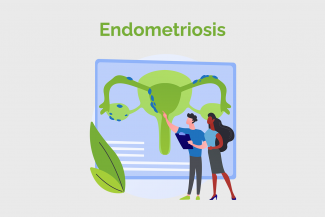
What causes endometriosis
Even though doctors are not absolutely sure, they suggest some of the following causes:
Genetic: A 10-fold increased risk was found in first-degree relatives of women with endometriosis. It has been suggested that endometriosis results from a series of multiple hits within target genes in a mechanism similar to the development of cancer. In this case, the initial mutation may be either somatic or heritable. (Somatic refers to changes in the genetic structure that are not inherited and won’t be passed to offspring. These are the alterations in DNA that occur after conception. Somatic mutations can occur in any of the cells of the body except the germ cells - sperm and egg - and therefore are not passed on to children.)
Retrograde menstruation: In some women, menstrual blood (containing endometrial cells) flows back into the pelvic cavity, where the cells are deposited on the walls and organs and continue to grow.
Surgery: During surgeries like C-section, endometrial cells may attach to a surgical incision and start growing from there.
Endometrial cells transport: The blood vessels and lymph nodes may carry endometrial cells to other parts of the body.
Immune system: It is possible that in women with endometriosis, their bodies’ immune system does not destroy endometrial tissues outside the uterus.
However, it is important to note that genetic or immune differences are probably the most critical triggers for endometriosis.








